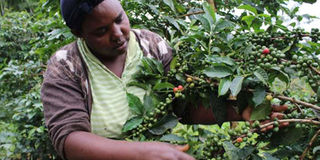Enduring lesson from coffee guru on farmers’ companies

A farmer tends to her coffee plantation in Ruiru. Farmer-owned limited liability companies work more efficiently than State-controlled commodity marketing boards, Jaindi Kisero argues. FILE PHOTO | NATION MEDIA GROUP
What you need to know:
Henry Kinyua inspired respect and fear bordering on awe.
The most enduring lesson we must learn from the life and times of Mr Kinyua is that farmer-owned limited liability companies, which hold regular annual general meetings and are run by elected directors and CEOs that are appointed by the board, work more efficiently than State-controlled commodity marketing boards.
There was a time when the business pages of the newspapers would be dominated by news about coffee. And, as young impressionable business reporters just out of university, we would spend a lot of time in the corridors of both the Coffee Board of Kenya and the Kenya Planters Co-operative Union (KPCU), digging up information, interacting with news sources, tracking goings-on at the coffee auctions, and debating issues with key players in the industry.
The views, impressions and the knowledge I have of the former CEO of KPCU, Henry Kinyua, who died recently, were formed during those momentous times.
Kinyua inspired respect and fear bordering on awe. In those days, the KPCU had a balance sheet size larger than that most of these blue-chip companies listed on the Nairobi Securities Exchange.
He stewarded this farmer-owned company - the only coffee milling plant at that time – with brutal efficiency. When a book is written about the glorious coffee years in Kenya, there will be a full chapter dedicated to the life and times of Henry Kinyua.
Such was the influence and stature he commanded in the coffee industry that even in the days of the single-party dictatorship when what former President Daniel arap Moi said was law, Kinyua and representatives of coffee farmers would come out loudly to resist arbitrary government decisions. In terms of activism and resistance to arbitrary State decisions, the likes of Henry Kinyua were there long before the agitation that led to the so-called Second Liberation began.
POLITICAL CONTEXT
You have to examine the political context to appreciate the risks he and his ilk were prepared to take to insulate the coffee industry from power-hungry and corrupt operatives.
The Moi regime did not like autonomously-run farmer-owned companies like KPCU. It wanted to bring all under the control of the office of the Commissioner of Co-operatives.
The first to be dissolved was the Kenya Farmers Association, a profitable company that had been created by European settler farmers in the colonial days to buy inputs in bulk, which it sold to farmers.
The KFA was transformed into the Kenya Grain Growers Association. In retrospect, the manner in which the dissolution was conducted was itself a study on impunity.
I still remember how Mr Moi’s henchmen headed for Afraha Stadium in Nakuru where thousands of non-farmers ferried there by Rift Valley politicians voted to turn the farmers’ company into a full-fledged firm under the Commissioner of Co-operatives.
To complete the takeover, the then Commissioner of Co-operatives, Alfrick Birgen, was made managing director. The next farmers-owned company to be targeted was the Kenya Co-operative Creameries, which although technically registered as a co-operative, was a private company listed on the bourse.
The assault on Kinyua started with a claim by a minister in Parliament that he earned more money than President Moi, in the hope of inciting coffee farmers against him. It did not work.
In March 1987, Kinyua and Zacharia Gakunju, led farmers in protesting about a decision by the Ministry of Agriculture to remove him from the board of the Coffee Board.
A DIRECTIVE
In May, they led farmers in protesting a directive by President Moi to dissolve KPCU and to replace it with an entity called the National Co-operative Coffee Union.
Even though he was eventually forced out, Kinyua left behind a profitable company paying dividends and bonuses to farmers year in and out.
That’s when the rain started beating us. We applied the policy of liberalisation uncritically – as if it was dogma – and in the process, dismantled the institutions and pillars upon which the coffee industry rested, without replacing them with new and more efficient ones.
The Coffee Board of Kenya operated as a farmers’ company – the majority of its directors elected at an annual conference in which all coffee farming districts were represented.
The Coffee Research Foundation under Dr Wilson Opile was a well-funded robust entity conducting rigorous cutting-edge research on modern agronomical practices and passing it on to farmers. Ruiru 11, the pest-resistant seed variety, was developed locally by this foundation.
The most enduring lesson we must learn from the life and times of Henry Kinyua is that farmer-owned limited liability companies, which hold regular annual general meetings and are run by elected directors and CEOs that are appointed by the board, work more efficiently than State-controlled commodity marketing boards.





